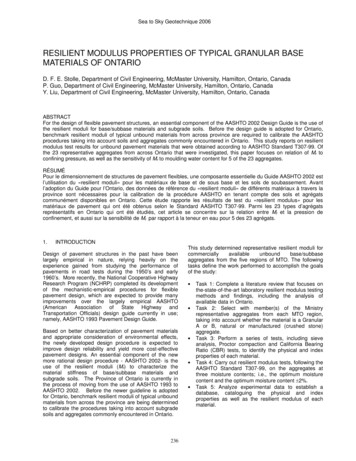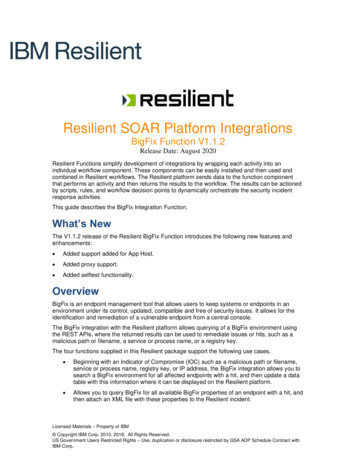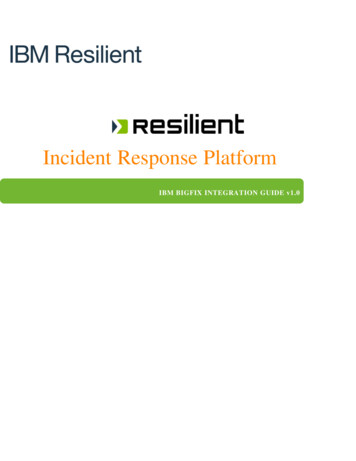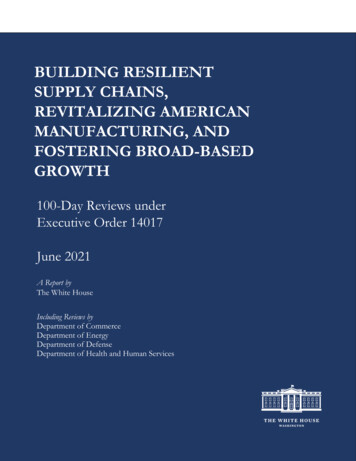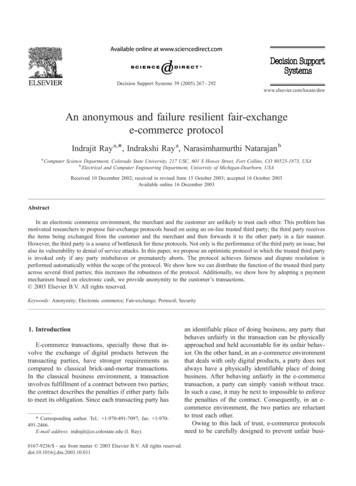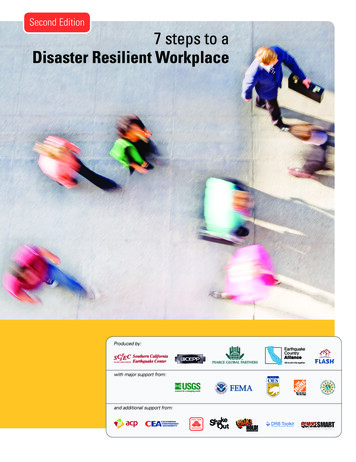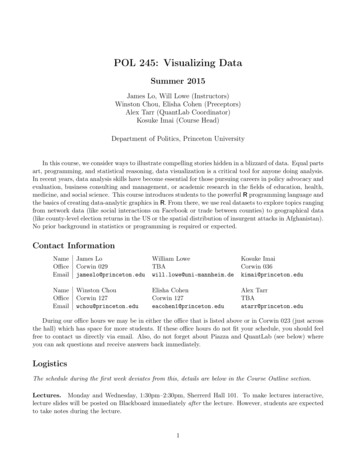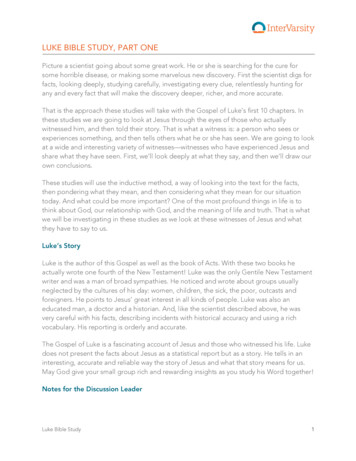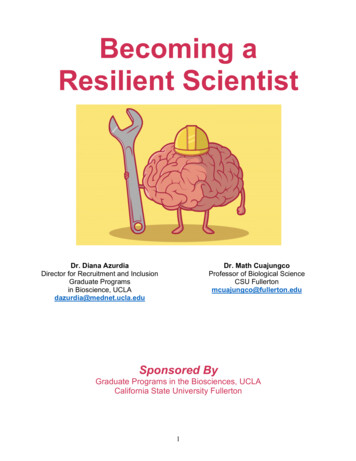
Transcription
Becoming aResilient ScientistDr. Diana AzurdiaDirector for Recruitment and InclusionGraduate Programsin Bioscience, UCLAdazurdia@mednet.ucla.eduDr. Math CuajungcoProfessor of Biological ScienceCSU Fullertonmcuajungco@fullerton.eduSponsored ByGraduate Programs in the Biosciences, UCLACalifornia State University Fullerton1
Stages of LearningEnthusiastic beginner: A new student / faculty etc. is usually motivated, enthusiastic and excited about theopportunity to do something new. This person is already very motivated, requiring only a limited amount of support.What the person doesn't have is much information about what exactly is needed, how best to approach the task,etc.Disillusioned learner: This stage occurs when "the honeymoon is over." At this stage, the initial excitement of theproject has worn off, and some aspects of the project have proved more difficult than originally anticipated. Becausethe person is still learning and has little to show for his or her effort, the difficulties are especially frustrating.Capable but cautious performer: Once the person can complete a task successfully, they demonstrate that theycan do the job. But having only done it once and haven't had enough time to gain confidence in their abilities. As aresult, the person tends to be overly cautious.High achiever: At this stage of development, the person has demonstrated competence and commitment to doingthe task, and has essentially become self-managed.*Adapted from Ken Blanchard, Self-Leadership and the One Minute ManagerSELF-REFLECTION:Take 1 minute. Consider a few times when you hit the disillusioned learner phase, in your academiccareer. Reflect on the outcomes. In each situation, focus on your thoughts, attitudes and behaviors both what you did and what you did not do during and after the difficult experience?SHARE:With a partner, take a few minutes to discuss your experience with the disillusioned learner phase.1
Mindset rs-pt1/Watch: Carol Dweck’s Ted Talk on “The Power of Yet” :https://www.ted.com/talks/carol dweck the power of believing that you can improve?language enPractice: What’s a More Helpful Thought?Instead of Try this I’m not a good public speaker.I’m sooo dumb to make that mistake.Her poster is better than mine; minewill never be that good.I’m really good at excel.I’m just not very assertive and can’ttalk to my mentor about that.I won’t raise my hand because myquestion won’t be that insightful.2
Common Cognitive Distortions(ANTs – Automatic Negative Thoughts)Dichotomous Thinking: Using all-or-nothing thinkingMind-Reading: Assuming you know what another thinksEmotional Reasoning: Using feelings to verify factsPersonalization: Subjectively interpreting all events as they relate to youOvergeneralization: Seeing a single negative event as part of a continual patternof defeatCatastrophizing: Exaggerating the significance of a negative event, assessing allevents as horribleShould-Statements: Engaging in self-instructions that command or prodSelective Abstraction: Focusing on one selected piece of informationDiscounting the Positive: Transforming positive or neutral events into negativeonesLabeling: Self name calling based on one mistake or negative eventPersonalization/Blame: Assuming responsibility for a negative event when thereis no basis for itImpostor Syndrome: Doubting your accomplishments and having a persistentinternalized fear of being exposed as a "fraud"SELF-REFLECTION:Take 1 minute. Do you identify with any of these common cognitive distortions/ANTs? Circle 1-2that feel the most familiar to your thought patterns.3
Tools to Break the Cycle of Negative Self-TalkHATS Strategy Hear and recognize negative self-talk for what it isAppreciate you have a choice (to listen or not)Talk back to the negative voice (giraffe language)Seek resources and take action4
Managing Stressful Situations by Disputing Automatic Negative ThoughtsDescribe astressfulsituation youexperiencedAMPLEI studied allweekend and Istill got a B- onmy first examWhatemotionsdid youexperience?FrustrationDepressionDescribe anynegative self-talkyou usedLabel any relatedANTs/cognitive distortionsand negative behaviorsHow would youdispute ANTs withPositive CounterStatements?What PositiveBehaviors you willuse instead?Self-Talk: “I’m such an idiot,why didn’t I study harder?I’m going to fail and myparents are going to thinkthat I’m wasting my life!”Counter Statement:“It’s only the first testand it’s only worth 5%of my grade.”ANT Type: LabelingANT Type: Mind ReadingNegative Behaviors: Procrastinated 3 hours withvideo games Didn’t eat dinnerSelf-Talk:Positive Behavior: Built a spread outstudy schedule toavoid cramming thatthat allows forbreaks to eat andexerciseCounter Statement:YOUANT Type(s):Positive Behavior:Negative Behaviors:Try on Your Own:Come up with counter statements and positive behaviors to use instead in future situations.5
Further Reading List Unmasking the 0521/pdf/nj7245-468a.pdfImpostor Syndrome Is Definitely a yndrome-Is/238418Mindset: The New Psychology of Success; Carol DweckEmotional Intelligence: Why It Can Matter More Than IQ; Dan GolemanPrimal Leadership: Learning to Lead with Emotional Intelligence; Daniel Goleman,Richard Boyatzis, and Annie McKeeThe Happiness Handbook, 3rd Edition; Timothy SharpLearned Optimism: How to Change Your Mind and Your Life; Martin E.P. SeligmanAuthentic Happiness; Martin E.P. SeligmanFlourish: A Visionary New Understanding of Happiness; Martin E.P. SeligmanSelf-Compassion: Stop Beating Yourself Up and Leave Insecurity Behind; Kristin NeffTaking the Leap: Freeing Ourselves from Old Habits and Fears; Pema ChodronThirteen Things Mentally Strong People Don’t Do; Amy Morin6
1 Stages of Learning Enthusiastic beginner: A new student / faculty etc. is usually motivated, enthusiastic and excited about the opportunity to do something new. This person is already ve


